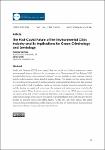The Post-Covid Future of the Environmental Crisis Industry and its Implications for Green Criminology and Zemiology
| dc.contributor.author | Raymen, T | |
| dc.contributor.author | Smith, O | |
| dc.date.accessioned | 2023-10-12T11:51:44Z | |
| dc.date.available | 2023-10-12T11:51:44Z | |
| dc.date.issued | 2021-10-03 | |
| dc.identifier.issn | 2752-3799 | |
| dc.identifier.issn | 2752-3799 | |
| dc.identifier.uri | https://pearl.plymouth.ac.uk/handle/10026.1/21386 | |
| dc.description.abstract |
Smith and Brisman (2020) have argued that our social and cultural orientation toward environmental crises is influenced by the existence of an ‘Environmental Crisis Industry’ (ECI hereafter) that favours environmental ‘solutions’ that are palatable to state corporate interests and the global consumer classes ahead of systemic change. This article, however, argues that the ECI is evolving in the context of political-economic and geopolitical changes that have emerged as a result of the Covid-19 pandemic, and is becoming increasingly focused on renewable energy and the shoring up supply and control over the minerals and natural resources crucial to the energy transition. These, however, are not without their own harms. While green criminology has spent a great deal of time considering the harms and consequences of failing to seriously tackle climate change, it has scarcely considered the potential harms that could emerge if the ECI decided to seriously pursue zero-carbon targets. As the ECI gets more serious, this article considers these potential harms and the implications this has for criminologists and zemiologists interested in climate change and environmental harm. | |
| dc.format.extent | 63-87 | |
| dc.publisher | Northumbria University Library | |
| dc.subject | 4802 Environmental and Resources Law | |
| dc.subject | 48 Law and Legal Studies | |
| dc.subject | 44 Human Society | |
| dc.subject | 13 Climate Action | |
| dc.subject | 7 Affordable and Clean Energy | |
| dc.title | The Post-Covid Future of the Environmental Crisis Industry and its Implications for Green Criminology and Zemiology | |
| dc.type | journal-article | |
| plymouth.issue | 1 | |
| plymouth.volume | 1 | |
| plymouth.publisher-url | http://dx.doi.org/10.19164/jcche.v1i1.1166 | |
| plymouth.publication-status | Published online | |
| plymouth.journal | Journal of Contemporary Crime, Harm, and Ethics | |
| dc.identifier.doi | 10.19164/jcche.v1i1.1166 | |
| plymouth.organisational-group | |Plymouth | |
| plymouth.organisational-group | |Plymouth|Research Groups | |
| plymouth.organisational-group | |Plymouth|Faculty of Arts, Humanities and Business | |
| plymouth.organisational-group | |Plymouth|Research Groups|Institute of Health and Community | |
| plymouth.organisational-group | |Plymouth|REF 2021 Researchers by UoA | |
| plymouth.organisational-group | |Plymouth|Users by role | |
| plymouth.organisational-group | |Plymouth|Users by role|Academics | |
| plymouth.organisational-group | |Plymouth|REF 2021 Researchers by UoA|UoA18 Law | |
| plymouth.organisational-group | |Plymouth|Faculty of Arts, Humanities and Business|School of Society and Culture | |
| dcterms.dateAccepted | 2021-01-01 | |
| dc.date.updated | 2023-10-12T11:51:44Z | |
| dc.rights.embargodate | 2023-10-17 | |
| dc.identifier.eissn | 2752-3799 | |
| rioxxterms.versionofrecord | 10.19164/jcche.v1i1.1166 |


